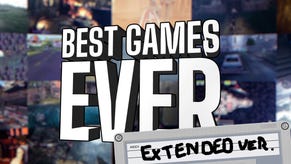Steam Greenlight "going away" is probably a good thing, but why? - opinion
Valve's 'Steam Dev Days' event in Seattle has given us some insight into the company's modus operandi, but after one developer tweeted that Steam Greenlight is "going away," it got VG247's Dave Cook feeling relieved.
”Be honest; how many of these 100 Greenlight games have you actually heard of and/or intend to buy? Have you bought any of them for that matter? Such saturation could endanger the visibility of truly innovative indie titles”
I'm all for bringing democratization to game development and sales. The process of letting the people have a say in which games get sold on Steam is a positive step, but it needs to change. There are still problems within the process that need to be ironed out. When Hot Blooded Games CFO Dave Oshry - who was attending Steam Dev Days - tweeted that Valve's Gabe Newell wants to make “Greenlight go away," it became clear that Steam has its head screwed on tighter than some might suggest.
I've spoken with a lot of indie game developers over the last 12 months who would really benefit from having their games on Steam. Most of them did already, and yes, some of them entered the industry using Greenlight. It is a useful launch-pad for projects and studios that would typically have doors slammed in their faces by the big publishers. If anything, it makes the route to market less rocky as long as the concept is worth voting for. By that logic, only the cream of Greenlight should pass the voting phase and become actual Steam products you can buy.
But the problem is not the fact that up-votes can be encouraged for games that perhaps aren't all that deserving, but it's a matter of saturation. As each round of successful Greenlight titles makes it to the store, we always report it. Here we have 50 new games joining Steam, another 100 titles, and here's a further 40. It is refreshing to see these projects placed in front of gamers, away from the relatively closed nature of the console play-pen. This is undeniably a good thing.
However, I recently spoke with Vlambeer co-founder Rami Ismail, and we discussed many facets of indie development, including routes to market. It was a familiar conversation; one that saw us lambasting the sheer, suffocating influx of content on the iOS App Store, which undoubtedly makes it difficult to stand out among the Rovios, Half-Bricks and Gamelofts of this world. iTunes is a lottery few win, and it's because there's simply too much content.
He showed me his metrics graph for Ridiculous Fishing, and while it was making more than other games I've seen figures for, the pattern of that table may as well have come from any other developer I've spoken to on the matter. Bossa showed off its metrics at GameHorizon last year, and the graph started with a decent spike - because it was a featured app in the App Store's 'new' section - and from there it was a sliding slope, cratering down to a slow crawl, only occasionally rising whenever there's a sale on, or a run of press coverage. This is common.
”I’m not a psychic, nor do I have any insider information on what Valve plans to do with Greenlight. All I know is that the consensus among my interviewees suggests that things need to change. Could developer-specific Steam stores be the answer?”
Now, I concede that I haven't seen Steam Greenlight metrics, but all of the developers I've spoken to about the service so far have agreed that there's a saturation risk. Be honest; how many of these 100 Greenlight games have you actually heard of and/or intend to buy? Have you bought any of them for that matter? Such saturation could endanger the visibility of truly innovative indie titles. You could say, 'well, if the game's good then the press will surely cover it, won't they?' You'd be correct, but how many indie teams - of fewer than ten people - have the contacts or know-how to get their game coverage in media outlets?
I recently attended a seminar here in Scotland filled with developers who agreed that Greenlight needs some work, and when I asked them who they go to in the press to get coverage from they said 'no-one,' because they either don't have the skills and capital to market their game solo, write a press release, gain the contacts needed to secure reviews, or that the press simply don't give a s**t about their title - what with all the Call of Duty rumours, next-gen chatter and such going on. Such games play second fiddle in the mainstream press, and so it falls on gamer-driven programs like Greenlight to champion new, exciting projects.
That is why I feel Greenlight is a good thing, but not if it is saturating the market. Saturation isn't good for any market - not just games - but this is what is in danger of happening here. What's the answer? Well, Newell's full quote was, "Our goal is to make Greenlight go away. Not because it’s not useful, but because we’re evolving." Reportedly, he wants to bridge the gap between development and publishing. That suggests - to me - that studios are to be given greater publishing control.
During my discussion with Rami at Vlambeer, he theorised that Valve could give each studio it's own store so they could set pricing, gain followers for their studio to help them grow as a brand, and ultimately, make them stand out better amongst any potential saturation. Just think about what that could mean: Steam stores for each developer. It might sound far-fetched, but it could bring further autonomy and power to indies and the mid-tier through the long term.
Unless it's not already clear; I'm not a psychic, nor do I have any insider information on what Valve plans to do with Greenlight. All I know is that the consensus among my interviewees suggests that things need to change. Could developer-specific Steam stores be the answer? I'll have to actually ask a psychic to find out at this time.
What do you think?









.jpg?width=291&height=164&fit=crop&quality=80&format=jpg&auto=webp)
